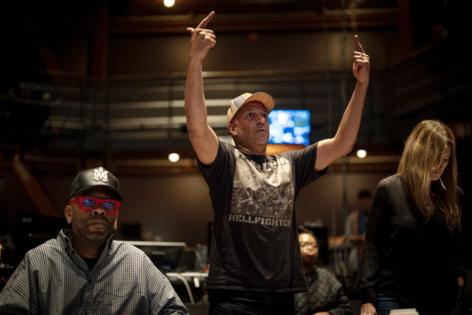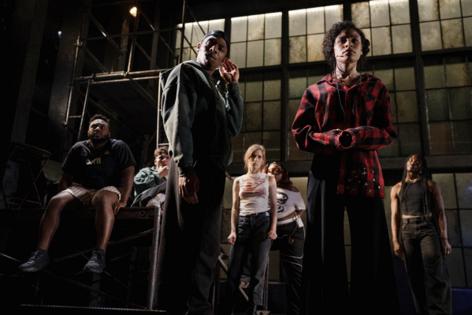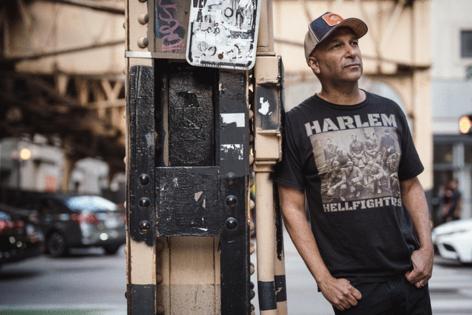Speaking truth to power: Tom Morello on his Goodman debut, activist art and growing up in Libertyville
Published in Entertainment News
CHICAGO — Tom Morello took in the news with a blank expression.
He was not surprised, he was not shocked, but no, he had not heard yet: Just hours earlier, 10 miles south of where he was at the Goodman Theatre, rehearsing a new musical about a militarized occupation of the South Side, federal immigration officers rappelled from helicopters and stormed into residential apartments on South Shore Drive.
“Today,” he said.
It was not a question. More like an affirmation. Outside on the sidewalk was a chalked reminder of the latest “No Kings” protest. A few blocks away, a group of elderly women struck a modest resistance, waving small signs calling for the removal of ICE from Illinois. And here, inside the Goodman, Morello, native of Libertyville and resident of Los Angeles, was doing his part, building his latest rage against the machine. He smiled: “We are living in dangerous times — which is exactly why we need dangerous musicals.”
“Revolution(s),” by Chicago playwright Zayd Ayers Dohrn, now in previews at the Goodman Theatre, was written and inspired by Morello’s legacy of musical bomb-throwing, with additional lyrics by Killer Mike (Run the Jewels), Big Boi (Outkast), EDM duo Knife Party and country music’s Chris Stapleton. Dohrn thinks of it “not as a jukebox musical but more like a mixed-tape musical,” albeit centered on Morello, whose activist bonafides are arguably unmatched among contemporary musicians: He co-founded Rage Against the Machine, as well as Audioslave with Chris Cornell of Soundgarden, and Prophets of Rage with Public Enemy’s Chuck D, then became a touring member of Bruce Springsteen’s E Street Band. Since January, it’s been hard to avoid a social media post not soundtracked with Morello, sometimes using his folky alter ego The Nightwatchman, more often using the combative, sonically angular guitars of Rage Against the Machine.
The show, however, Dohrn said, plays closer to Morello the man, who “has a defiant personality, but never goes about it in a lecturing way. We want to talk to people outside of the Chicago political bubble of progressives — think Springsteen, or Tom, people who have been making music meant for an audience that is not always aligned with them politically, yet their politics are in there.”
Morello took a break from rehearsals to talk about his work, his suburban childhood and the future of activist art. The following conversation was condensed and edited from a longer conversation:
Q: This play started years ago, long before whatever’s happening now.
A: It did. Zayd called me during pandemic times. He asked permission to write a story using my music, and I’d known him because I was friends with his parents, Bernardine Dohrn and Bill Ayers (co-founders of the militant activist group Weather Underground), who are the fairy godparents to my children. He was a fan of my music and wanted to weave a story throughout it. I told him, do anything you want, but let’s see. He wrote a beautiful Chicago story, beautiful veteran story, beautiful revolutionary story that seemed perfectly matched to the depth of a 22-album catalog. I loved the book he wrote for the show, but how would it work on stage? I was skeptical, frankly. After Goodman offered an opportunity to try, I was overwhelmed at how incredibly the music had been woven in. I didn’t want a stereotypical musical. I wanted a bit more like a radical theater event.
Q: Do you have any theater background?
A: I can bust out a little Chaucer right now if you want. I was in every play and musical at Libertyville High School. Drama club was my home. It was full of misfits. My high school band, the Electric Sheep, were the drama club band — Adam Jones of Tool was in it. I started playing guitar at 17 and I didn’t know how to play. I was inspired by punk rock. I walked into Libertyville High School drama club one day and said ‘A punk band is forming, I’m the guitar player, if you want to be in it, raise your hand. No experience required.’ And a band emerged. But yes, this is the first professional (theater) I’ve done.
Q: Did you ever think of your music, which is big and dramatic, as theatrical to begin with?
A: Yeah. But the context here, the medium, changed. For this historical moment, with troops in the streets of Chicago, the music is telling a story of love and generational resistance. The convergence of art and reality couldn’t have been imagined. Ideas in this show and music could, in the not-distant future, be censored, erased. Seriously. People with the wrong skin color or sexual orientation are on the chopping block. And yet in the midst of that, ground zero for some fascist evolution, we just so happen to be making an anti-fascist musical right here in downtown Chicago.
Q: Has this year — the ICE raids and so on — changed how you approach music?
A: I don’t know. There are times when you are engaged, for lack of a better term, in protest music and you feel like you’re preaching to the converted. There are also times you’re in the middle of a historical crisis and you need ask yourself: What are you doing in your vocation? As Howard Zinn famously said, you can’t be neutral on a moving train. If you have a country theoretically moving towards a fascist dictatorship, you can help move it that way — you can turn in your neighbors. Or you can push against it and do everything you can, defined by whomever you are. Or you can stand on the sidelines and watch. Three things, only two outcomes: This stops or this happens. So, as for what I do, this show is one way to tip the scales toward freedom and democracy and justice.
Q: Has being outwardly political ever caused issues for you personally?
A: Yeah, but there is a price to be paid when you speak unapologetically. I think of an important failure that led to my being here, now: Before Rage Against the Machine, I was in a band called Lock Up. We were on Geffen and we did everything everybody told us, the record company, the manager, the producer. They were the experts. They wanted to tone down my guitar playing — it sounded way too unusual. We had songs with messages and they would tell us they’d never get played on radio. We listened to everything they said, and we still got dropped from the label. I would never be a rock star, I would never make records. But I was still a musician, so I made myself a solemn vow — I would never again play a note I didn’t believe in, come what may. That’s been true of Rage Against the Machine and selling 20 million records, and it’s been true of playing acoustic guitar at a barricade in a protest, getting teargassed. I decided to never take a step back.
Q: You’re playing protests?
A: Oh, all the time. I was just at a No Kings protest, and I just released a song called “Pretend You Remember Me,” in response to the fascist ICE raids in Los Angeles. I look at this Goodman show as the last big theatrical event before they throw us all in jail!
Q: Your mom was the key to your politics, right?
A: Mary Morello. She’s 102. Her birthday was yesterday. She was from a small town in central Illinois, Marseilles. Her family were coal miners who came from Italy. She was maybe the only person in Marseilles to leave and explore the world. She traveled, 20 years as a single woman teaching English in Spain, Japan, Germany. She eventually taught in Kenya and met my dad. We lived in Harlem when I was young. They split and we moved to Libertyville, so that’s where I grew up. It was the one place that would hire a teacher from an interracial family. She became a lifelong advocate of human rights, in a conservative suburb. To this day, I still practice in her basement.
Q: What was Libertyville like for you growing up?
A: That’s a complicated answer. On one hand, it was bucolic. Public high school with swimming pools and three football fields. On the other hand, someone placed a noose in our garage when I was 13. According to real estate agents, when we moved in, I was literally integrating the town of Libertyville. So, it was complicated, but the one thing I had was Mary Morello and her insistence on my self-worth. That was formative to me.
Q: How did you identify racially then?
A: When fools put a noose in your garage, when you get called the n-word when you’re 3, you identify as Black! It was not up to me! The funny thing is, in Rage Against the Machine, I’d reference being Black and hear from fans that no, I was not. My skin tone remained the same, but I changed colors! I promise, in Libertyville, people played with my hair and questioned if I was their intellectual equals. Some fans still don’t sleep well over my being Black. Cognitive dissonance.
Q: You were a metal guy at first.
A: Totally metal.
Q: How were you introduced to political music?
A: Because I was politically minded and a fan of metal. But I know what you mean. My politics began in day care when justice met me on a racist playground. And in the books in our bookshelves at home, and the posters on our walls. I assume there weren’t many houses in Libertyville with Che Guevara on the walls. But the first political music for me was The Clash. I was interested in the Weather Underground and the Black Panthers and KISS and AC/DC. Which are pretty different worlds! Then someone brought (The Clash album) “London Calling” into school. There was this guy smashing a bass on the cover. I assumed it was metal. It was not. It was music with a point of view and intent and it rocked. I felt it in my heart. I thought rock meant groupies and the devil, but no, it could mean social justice. I saw the Clash in ‘82 at the Aragon. What I took away, and I don’t mean this glibly, was a T-shirt! My rock T-shirts had always showed like dragons and stuff. But theirs said: “The Future is Unwritten.” Here, I saw, was a different kind of band.
Q: How do you feel, with Rage, and with your solo work, about audience members who are just there for the music and they don’t subscribe to your politics?
A: I’m clear on that: I want a big tent. There are no great political bands. There are great bands. Some bands carry a political message, but if you’re not a great band first, no one cares. One thing about a ferociously rocking band is they attract people who like to ferociously rock, and that’s a broad political spectrum. Some of the people you’re preaching to are converted, but the converted need preaching to! They need a place to feel safe and get elements of their culture to steel their spines in dark moments. There are also people who like aggressive music but have never been exposed to these ideas and are now forced to confront them. Sometimes they learn something. Not a day goes by that I don’t run into a fan who became a public defender or an anarchist brick thrower or a school teacher. But some do tune it out. Some completely disagree or misunderstand it, but you can’t have categories one and two without a third category, so really, that’s OK.
Q: Watching rehearsal, I was thinking I haven’t heard much protest music lately.
A: There is a lot of protest music out there! The (Kendrick Lamar) Super Bowl halftime show last winter. That was a protest on the biggest stage in the world. At the same time, you’re not wrong — the charts are not exactly choking in songs of resistance right now.
Q: Surely you saw how ubiquitous your music was around the inauguration. For awhile all of social media seemed like it was set to Rage Against the Machine.
A: Yeah, and I was at the No Kings and Anti-ICE protests in Los Angeles and the streets were filled with Rage Against the Machine songs. I’m glad to see that music active in the world. It’s doing, in many ways, what we intended, for it to be present in troubled times.
Q: Do you get endorsement offers? Regardless of how radical the politics might be in the song, do you get offers to use them in commercials?
A: All day, every day. There is always some corny commercial or a Japanese car commercial or a movie, but look, we just don’t respond — this music is not for that.
Q: Yeah, but a lot of musicians have said that. And attitudes toward selling music for commercial reasons — selling out, so to speak — have shifted radically.
A: Dramatically. My take is everyone has to decide what their art is for and what is it is not for. You let Q101 play your song, it’s out in the world. That’s a commercial step. Doing an interview with this newspaper is a commercial step. That said, what is not for sale? If someone wanted a Rage Against the Machine song, they’d be buying not only a song but the song’s relationship with its listeners, and that, for me, that’s not for sale.
Q: Would you ever go into politics?
A: I was scheduling secretary for United States Senator Alan Cranston for two years. And that cured me. You think the way sausage is made is gross — it’s grosser than you think. Plus, I work in politics every day. I went into politics the day I picked up a guitar.
———
“Revolution(s)” runs through Nov. 9 in the Goodman’s Owen Theatre, 170 N. Dearborn St.; 312-443-3800 and www.goodmantheatre.org.
———
©2025 Chicago Tribune. Visit at chicagotribune.com. Distributed by Tribune Content Agency, LLC.


















Comments